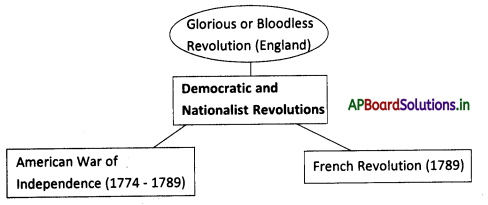Students can go through AP State Board 9th Class Social Studies Notes Chapter 13 Democratic and Nationalist Revolutions 17th and 18th Centuries to understand and remember the concept easily.
AP State Board Syllabus 9th Class Social Studies Notes Chapter 13 Democratic and Nationalist Revolutions 17th and 18th Centuries
→ In 1603, James I of the Stuart dynasty became the King of England. He was succeeded by Charles I. He was executed in 1649. In 1688 the Glorious Revolution restricted the powers of the king and the supreme power was transferred to the Parliament.
→ England established thirteen colonies in the USA. “No Taxation without Representation” was the slogan of the American war of independence. The Declaration of Independence was adopted in 1776. War ended in 1783 and the USA became a republic in 1789.
→ In 1774, Louis XVI became the king of France. He was inefficient and was under the control of his wife Marie Antoinette. Long years of war had emptied the financial resources.
→ The French society was divided into three estates -1) Clergy, 2) Nobility, 3) Rest of the people. The first two classes were privileged classes and there was a lot of discontent among the third estate.
→ Louis XVI called on the Parliament “the Estates-General in 1789. The Third Estate declared itself as National Assembly. On 14 July the agitated Mob broke open the gates of the Bastille jail. Finally, the King and the Queen were executed in 1793.
→ The period from 1793 to 1794 is known as the Reign of Terror under Jacobins under the leadership of Robespierre.
→ Women in France fought for their rights but it was finally in 1946 that women in France won the right to vote.
→ Glorious Revolution The Revolution of 1688 in England happened without shedding a drop of blood. This transformation, therefore, is known as “Glorious” or ‘Bloodless Revolution”.
![]()
→ Devine right: The rights that are provided by Gods are called Divine Rights.
→ Aristocracy: The Aristocracy is a class of people in some countries who have a high social rank and special titles.
→ Monarchy: Monarchy is a political system ¡n which all powers are concentrated in the hands of one single person.
→ Directory: An executive made up of five members.
→ Fraternity: Brotherhood.
→ National Assembly: On 20 June 1789 National Assembly was declared. It comprises three different institutions – the legislature, executive, and judiciary.
→ Civil war: Internal war in a country.
→ Guillotine: Beheaded by a machine.
→ Livres: Unit of currency in France till 1794.
→ Tithes: A tax levied by the church, comprising one-tenth of the agricultural produce.
→ Taille: Tax to be paid directly to the state.
![]()
→ Manor: An estate consisting of the lord’s lands and his mansion.
→ Chateau: Castle or a stately residence belonging to a king or a nobleman.
→ Clergy: Group of persons invested with special functions in the church.
→ Nobility: Aristocratic and bureaucratic class.
→ Convent: A building belonging to a community devoted to religious life.

→ Who were the inventors?
It is interesting to read about the individuals who brought these changes during industrialization. Few of them were trained scientists. Education in basic sciences like phys¬ics or chemistry was extremely limited until the late nineteenth century, even after the technological inventions described above. Since these inventions did not require full knowledge of the laws of physics or chemistry on which they were based, advances in science could be and were made by brilliant, intuitive thinkers and experimenters. They were helped by the fact that England had certain features which other European countries did not. Dozens of scientific journals and published papers of scientific societies appeared in England between 1760 and 1800. There was a widespread thirst for knowledge even in the smaller towns. This was met by the activities of the Society of Arts (founded in 1754), by traveling lecturers, or in ‘coffee houses’ that multiplied through the eighteenth century.
→ Most inventions happened because of determination, interest, curiosity, even luck, rather than the application of scientific knowledge. Some inventors in the cotton in¬dustry, like John Kay and James Hargreaves, were familiar with the skills of weaving and carpentry. Richard Arkwright, however, was a barber and wig-maker, Samuel Crompton was not technically skilled and Edmund Cartwright studied literature, medicine, and agriculture, ini¬tially wished to become a clergyman, and knew little of mechanics.
→ By contrast, in the area of steam engines, Thomas Savery, an army officer, Thomas Newcomen, a blacksmith and locksmith, and James Watt, with a strong mechanical bent, all had some knowledge relevant to their inventions. The road-builder, John Metcalf, who personally surveyed surfaces for roads and planned them, was blind. The canal builder James Brindley was almost illiterate, with such poor spelling that he could never spell the word ‘navigation’, but he had tremendous powers of memory, imagination, and concentration.